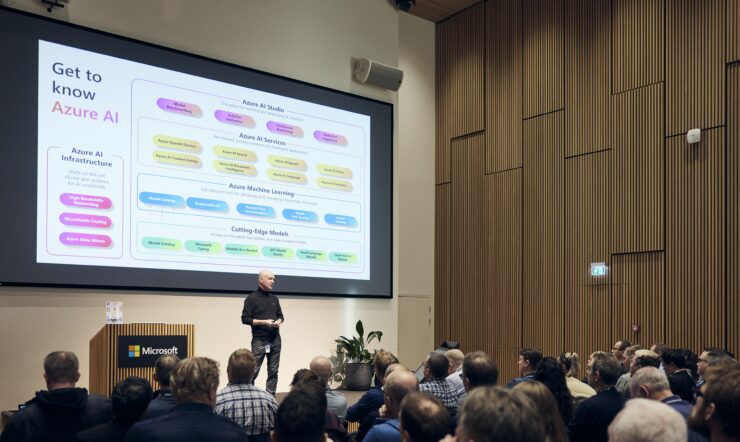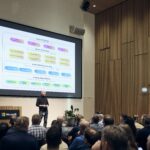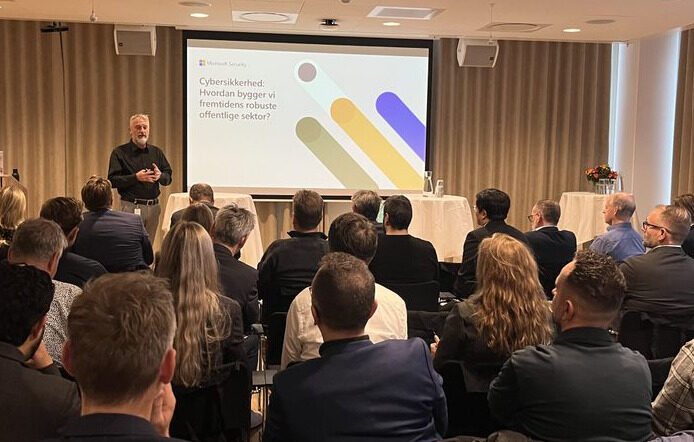For the past decade, organizations have faced numerous challenges in dealing with the staggering rates of data as they have raced to become more data driven. But, thanks to technological advancements and new innovative solutions, organizations can now leverage Microsoft Fabric and AI-powered analytics tools to enhance their data-driven approach.
On November 1st, Microsoft Denmark hosted its very first digital Discovery Day unveiling how organizations successfully can make the workdays of their employees more efficient and at the same time boost performance. This by unifying data silos, building machine learning models, and providing easy access to data insights across the organization.
A Glimpse into the Data-Powered Future
Jon Jahren, Senior Data & AI Architect at Microsoft, kicked off by presenting Microsoft’s visionary outlook for the ideal data world, which has been a key driver behind Microsoft’s innovations within data solutions for many years:
“In the ideal world, you would have all your data in one super intelligent brain, collecting all the data from your different business areas and providing actions and recommendations for everyone involved.”
– Jon Jahren, Senior Data & AI Architect, Microsoft
While this idea remains a distant goal in our current world, characterized by a variety of technologies, Jon Jahren emphasized that the key issue of today is understanding how to make technologies work better together. By doing so, organizations will be able to unlock the real value of the data they have collected and become more data-driven, without dealing with the costs and challenges related to current data silos.
Unifying Data for Seamless Collaboration
One of the tools that will play a crucial role in this transformation is Microsoft Fabric. Jon Jahren provided an in-depth introduction to the game-changing, end-to-end analytics platform that fundamentally unifies all data and analytics tools while strengthening the foundation for collaboration across the organization:
“We need to have a foundation where we can make it easier to work together and access the same data across different business units.” – Jon Jahren
This idea of unity and collaboration is essentially the core principle behind the unique features of Microsoft Fabric. One of which is OneLake – an open standard format data lake that automatically wires all Fabric workloads into specific domains. OneLake logically clusters data based on business needs, ensuring that employees can effortlessly upload and access data without the hindrance of data silos, inconsistent formats, or compliance concerns.
Moreover, the Microsoft Fabric platform introduces “Shortcuts,” a dynamic feature that empowers users to share data and applications efficiently, thereby eliminating the need for redundant data transfers.
The Role of AI in Easing Data Analytics
Another Microsoft expert on this topic, Dawey Yao, Senior Data & AI Architect at Microsoft, elaborated on Fabric’s technological philosophy. He emphasized how the platform has revolutionized data science by embracing automation and user-centric design:
“The philosophy behind Microsoft Fabric is to center people in the design of all the products and make them easy to use. It is not about getting people to understand the tool, but about making the tool easier to use.” – Dawey Yao, Senior Data & AI Architect, Microsoft
One way Fabric is democratizing data analysis and cost efficiency is through its integration with the Azure OpenAI Service. The AI-powered analytics of Fabric enables users to automatically generate real-time Power BI reports from the Lakehouse dataset. This feature is made possible by the Direct Lake Mode technology, which allows seamless data uploads from the Lakehouse to Power BI.
November 1st also marked the launch of Microsoft 365 Copilot, which will soon be available in Microsoft Fabric. This integration will enable users to generate code, connect to changing data in Power BI, visualize results, build machine learning models, and much more through conversational language via the Copilot chatbot. And it’s fair to say that this will have an enormous impact on the workday of the employees. During the testing phase, 55% of users reported that Copilot helped increase productivity, while 75% achieved improved code quality, highlighting how Copilot can help boost performance and reduce costs.
By illustrating how Microsoft Fabric can be used by organizations to become more data-driven, lower costs, and enhance productivity and collaboration, this very first Discovery Day highlighted some of the strengths of AI-powered tools. The attending organizations gained unique insights into the guiding principles behind Fabric’s foundation, along with a glimpse into the limitless possibilities that AI-driven analytics tools will offer in the future.













